Postpublished at 10:49 GMT 26 November 2014
UKIP MEP Patrick O'Flynn tweets: Here's me in the European Parliament today, external giving my reaction to the European Commission's latest investment plans
Hit 'Key Video' for Jean-Claude Juncker's presentation to MEPs of his proposed €300bn investment package to boost the struggling EU economy.
On-demand video for the rest of the day's proceedings can be found on the Democracy Live website.
Mr Juncker's speech was followed by a debate on the EU's position at an upcoming UN climate change conference taking place in Peru next month.
Before the lunchtime voting session, MEPs welcomed Dr Denis Mukwege, a Congolese gynaecologist, to receive Parliament's top human rights award.
The afternoon saw debates on the issue of Palestinian statehood and the 25th anniversary of the UN Convention on the Rights of the Child.
In the evening, MEPs debated the recent G20 summit, the digital single market and the current state of the EU steel industry.
Text can be slow to load on these pages. Please hit refresh (F5) if live text does not appear below.
Paul Seddon
UKIP MEP Patrick O'Flynn tweets: Here's me in the European Parliament today, external giving my reaction to the European Commission's latest investment plans
Polish MEP Jerzy Buzek is a former president of the Parliament, holding the role between 2009 and 2012.
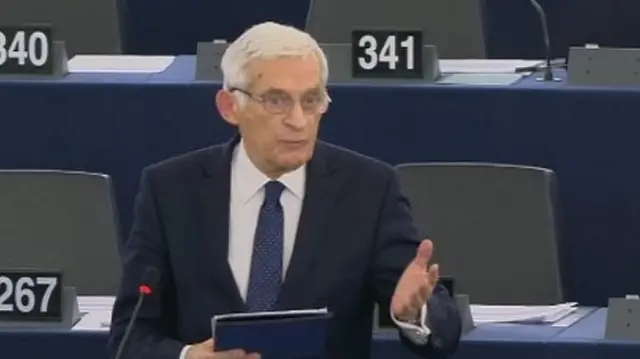
Spanish Left MEP Teresa Rodriguez-Rubio says that the EU's claims to be a leader on the issue of climate change are undermined by new figures that have emerged in her own country, which show 5.2% emissions rise in greenhouse gas emissions, despite a downturn in industrial output due to the economic crisis.
She goes on to say that large companies are "lining their pockets" with as a result of the EU's Emissions Trading System (ETS).
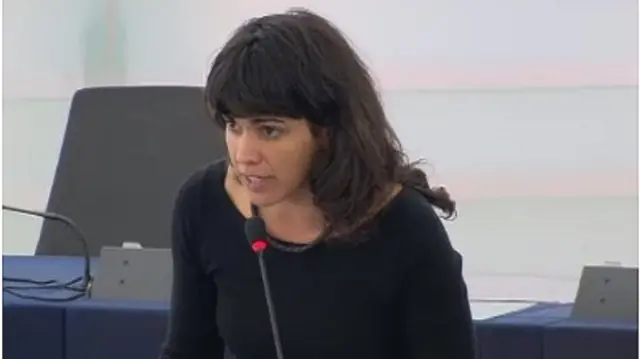
The system is a policy to reduce climate change in place in the 28 EU countries, plus Iceland, Liechtenstein and Norway - and covering more than 11,000 power stations and industrial plants.
Stations covered by the system have a cap set on the amount of certain greenhouse gases that they can emit.
They have the right, however, to buy and trade emissions "allowances" - which allow them to emit either one tonne of carbon dioxide, or the equivalent amount of two more powerful greenhouse gases, nitrous oxide (NO2) and perfluorocarbons (PFCs).
MEP Guy Verhofstadt, president of the Alliance of Liberals and Democrats for Europe, tweets: for #juncker fund: attract 100s of billions of savings sleeping in bank accounts & put serious guarantee scheme behind it, no public money
Many MEPs have been mentioning recent climate commitments made by the US and China - so what are they?
China and the US unveiled new pledges on greenhouse gas emissions earlier this month.
US President Barack Obama pledged to reduce US levels between 26%-28% by 2025, compared with 2005 levels.
China did not set a specific target, but said emissions would peak by 2030.
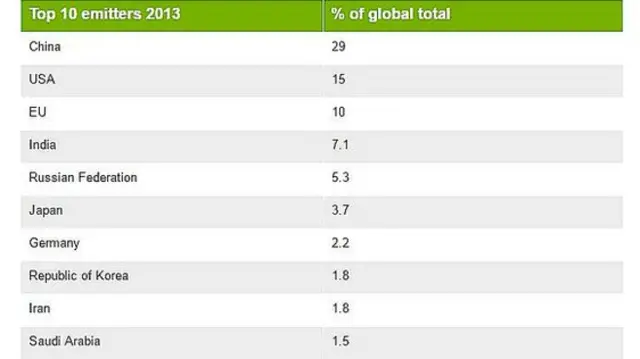
Today's debate follows a new set of EU climate change targets that were agreed by the leaders of the member states last month.
Leaders agreed a nationally binding target to cut greenhouse gas emissions by 40% below 1990 levels by the year 2030.
Other targets, which will only be binding at an EU level, aim to increase boost renewable energy use to 27% of the total energy mix, and increase energy efficiency by at least 27%.
The deal is set to replace the current energy targets, external, which relate to 2020.
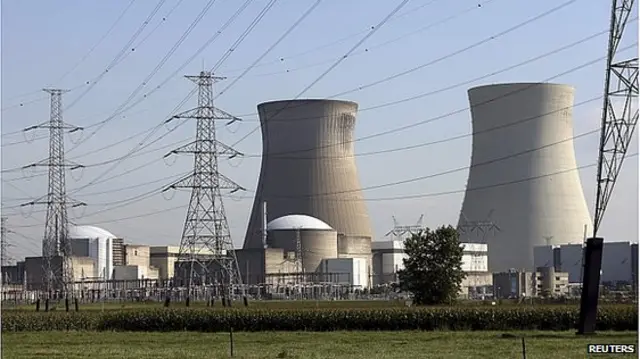 Image source, Reuters
Image source, ReutersGlobal Markets Forum tweets: #Juncker unveils investment plan to kick start EU growth, external via @reuters - Only snag is that there's no new money
Italian centre-right MEP Giovanni La Via continues a theme developed by a number of members so far, that the EU can only do so much to affect global climate change, and that the "ambitious political challenge" of the conference will be to convince big states like the United States and China to reduce their level of pollution.
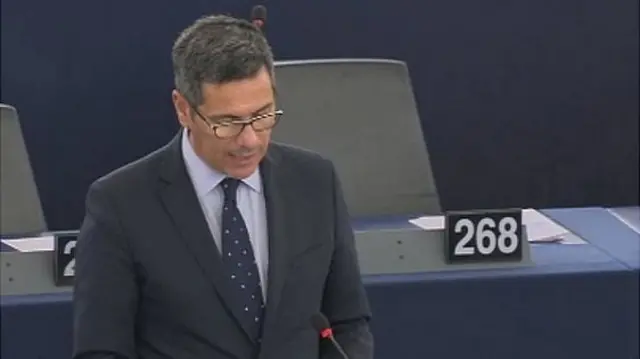
At the Lima conference next month, leaders are supposed to be making progress on a new global climate agreement, to be concluded at a later conference taking place in Paris at the end of next year.
Energy commissioner Miguel Arias Canete, who himself used to be an MEP, says the Lima conference next month will mark a "landmark moment" for world climate policy.
He notes, however, that the EU only accounts of around 10% of global gas emissions, and that more needs to be done to encourage heavy polluters such as China to cut their emissions too.
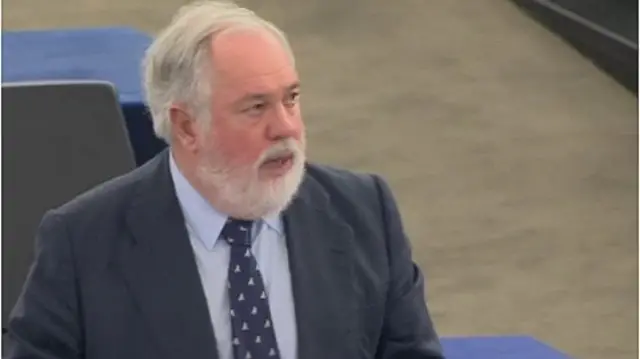
It also says that the agreement reached at Paris next year should include "clear steps" to reduce greenhouse gas emissions by at least 50% by 2050, compared to 1990 levels.
Last week, 30 countries pledged $9.3bn (£6bn) for the fund, which goes towards helping developing countries to cut greenhouse gas emissions and prepare for climate change.
The fund was to have held at least $10bn by the end of this year, so the pledge is just shy of the target.
MEPs will vote on a resolution, external approved by the environment committee earlier this month, that says EU countries should play a "key role" in the negotiations, and that rich nations should stick to their promise of giving $100bn per year to the UN's Green Climate Fund by 2020.
The next item on today's agenda is a debate about an upcoming UN climate change conference taking place in Peru next month.
The conference is due to be attended by the 192 countries that signed up to the UN's Framework Convention on Climate Change, external in 1992.
Commission vice-president for jobs and investment Jyrki Katainen says that the package is aiming to "change the way public money is used", through "sound investments for the future" that will create a better investment environment for lenders.
He repeats the calls of Jean Claude Junker, echoed by liberal leader Guy Verhofstadt, that national governments should do more to stimulate investment.
He calls "nonsense" the criticism levelled at the plans from some MEPs that this package does not represent "real money".
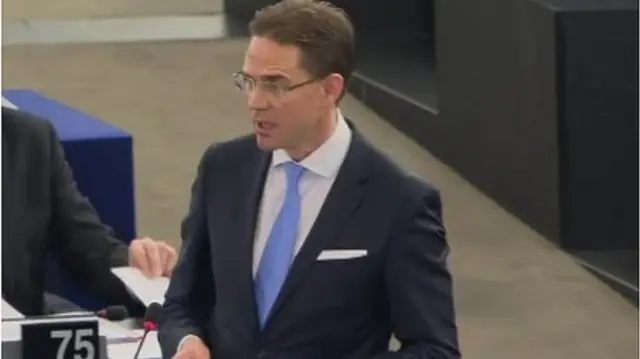
Speaking on behalf of the Council of Ministers, Italian finance minister Pietro Carlo Padoan says he believes "public resources can have an impact on private demand", and that the EIB, in conjunction with national banks, can play a "vital role" in spurring investment.
Italy currently holds the rotating presidency of the Council, which represents the government ministers of EU member states.
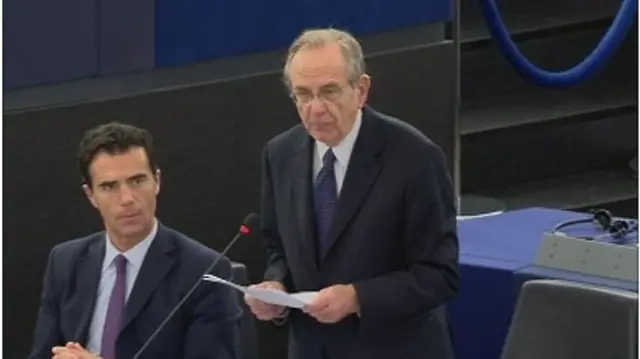
Of course, this debate is taking place in the context of a breakdown in negotiations between the European Parliament and the Council of Ministers over next year's EU budget, with MEPs refusing to accept the level of budgets cuts favoured by the member states.
At the start of last week, the two bodies failed to agree on a budget before the end of the so-called "conciliation period", forcing the European Commission to come up with a new proposal, which it has pledged to do before this Friday.
MEPs are also insisting that outstanding payments from 2014 are settled first, before any agreement on next year's budget can be found.
"The brutal truth is, you don't have 300 billion to spend, or anything like it," begins UKIP MEP Patrick O'Flynn.
He goes on to criticise the euro as system that locks poorly-performing economies into interest rates that better suit the economy of Germany.
"Twenty billion wrapped up to sound like 300 billion will not change that," he adds.
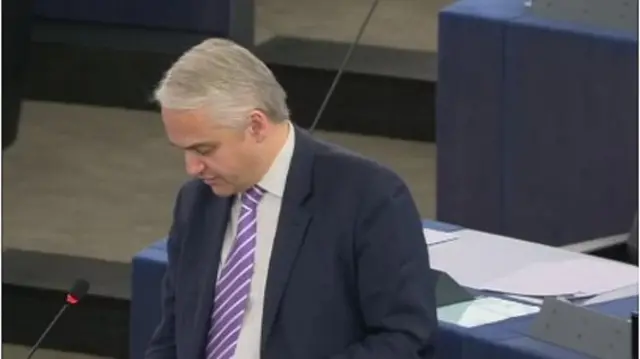
Belgian MEP and Green group co-leader Philippe Lamberts says the he wants to put an end to the "casino economy", and highlights that fighting "tax fraud" should be an "integral part" of any investment plans.
The plans have evidently failed to convince Dimitrios Papadimoulis, a Greek MEP speaking on behalf of the left-wing GUE/NGL group, who dismisses the plan as "empty words", with the plan not representing "a single euro of fresh money".